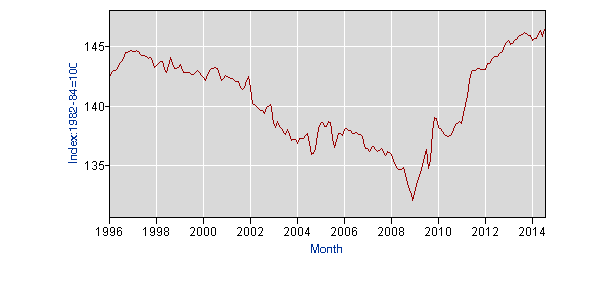September 18, 2014
The NYT gave us another article from the cult of zero, which highlighted a modest upward revision in the year over year inflation rate from 0.3 percent to 0.4 percent. The piece told readers:
“The revised figure for August suggests that inflation may have stabilized, but is unlikely to end a debate among economists about whether the eurozone is at risk of deflation — a broad, sustained decline in prices that is associated with depression and high unemployment.”
Actually Europe is already facing a period of very low inflation associated with depression and high unemployment. The low inflation rate makes it difficult for the European Central Bank (ECB) to push down the real interest rate so as to boost demand. Even at 0.4 percent the inflation rate is well below the ECB’s 2.0 percent target. And given the weakness of the euro zone economy, a higher inflation rate in the range of 3-4 percent would be desirable.
As the piece notes, many countries in the euro zone now actually have deflation. This is the only way they have to regain competitiveness with Germany, as long as Germany maintains a very low inflation rate. If Germany had a higher inflation rate, it would be possible for countries like Greece and Spain to gain competitiveness with moderate positive inflation. As it is, they have no choice but to endure massive unemployment in order to force wages and prices downward.
The piece is also mistaken in telling readers:
“When deflation takes hold, consumers delay major purchases because they expect prices to fall further. Corporate sales and profits suffer, which forces companies to lay off workers, creating a vicious circle of falling demand.”
Actually at low rate of inflation many prices are already falling. The overall inflation rate is simply an average of all price changes. When the inflation rate is near zero, many prices will be falling. The positive rate just means that somewhat more prices are rising, or that some prices are rising more rapidly.
Furthermore actual market prices may still be rising even if the measure of prices used in the government data shows falling prices. Statistical agencies use quality adjusted prices. The measures of quality improvement may more than offset a nominal increase in prices. Quality improvements are the main reason that computer prices have shown sharp price declines in government data over the last three decades. They are also the reason that car prices have been virtually unchanged from their level of 18 years ago.
Consumer Price Index, New Vehicle Component

Source: Bureau of Labor Statistics.







Comments